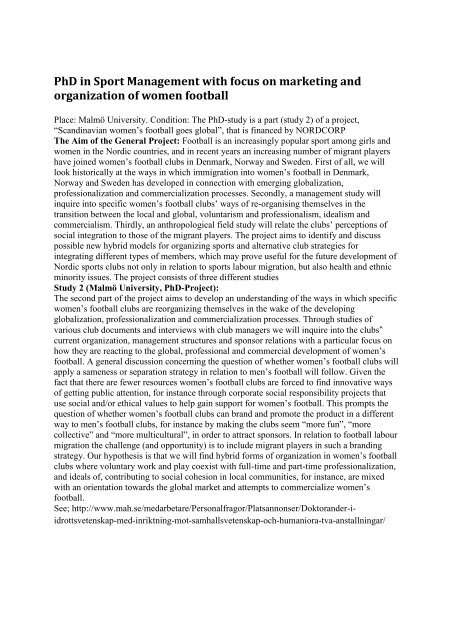Nr 2 - Svebi
Nr 2 - Svebi
Nr 2 - Svebi
Create successful ePaper yourself
Turn your PDF publications into a flip-book with our unique Google optimized e-Paper software.
Place: Malmö University. Condition: The PhD-study is a part (study 2) of a project,<br />
“Scandinavian women’s football goes global”, that is financed by NORDCORP<br />
The Aim of the General Project: Football is an increasingly popular sport among girls and<br />
women in the Nordic countries, and in recent years an increasing number of migrant players<br />
have joined women’s football clubs in Denmark, Norway and Sweden. First of all, we will<br />
look historically at the ways in which immigration into women’s football in Denmark,<br />
Norway and Sweden has developed in connection with emerging globalization,<br />
professionalization and commercialization processes. Secondly, a management study will<br />
inquire into specific women’s football clubs’ ways of re-organising themselves in the<br />
transition between the local and global, voluntarism and professionalism, idealism and<br />
commercialism. Thirdly, an anthropological field study will relate the clubs’ perceptions of<br />
social integration to those of the migrant players. The project aims to identify and discuss<br />
possible new hybrid models for organizing sports and alternative club strategies for<br />
integrating different types of members, which may prove useful for the future development of<br />
Nordic sports clubs not only in relation to sports labour migration, but also health and ethnic<br />
minority issues. The project consists of three different studies<br />
Study 2 (Malmö University, PhD-Project):<br />
The second part of the project aims to develop an understanding of the ways in which specific<br />
women’s football clubs are reorganizing themselves in the wake of the developing<br />
globalization, professionalization and commercialization processes. Through studies of<br />
various club documents and interviews with club managers we will inquire into the clubs‟<br />
current organization, management structures and sponsor relations with a particular focus on<br />
how they are reacting to the global, professional and commercial development of women’s<br />
football. A general discussion concerning the question of whether women’s football clubs will<br />
apply a sameness or separation strategy in relation to men’s football will follow. Given the<br />
fact that there are fewer resources women’s football clubs are forced to find innovative ways<br />
of getting public attention, for instance through corporate social responsibility projects that<br />
use social and/or ethical values to help gain support for women’s football. This prompts the<br />
question of whether women’s football clubs can brand and promote the product in a different<br />
way to men’s football clubs, for instance by making the clubs seem “more fun”, “more<br />
collective” and “more multicultural”, in order to attract sponsors. In relation to football labour<br />
migration the challenge (and opportunity) is to include migrant players in such a branding<br />
strategy. Our hypothesis is that we will find hybrid forms of organization in women’s football<br />
clubs where voluntary work and play coexist with full-time and part-time professionalization,<br />
and ideals of, contributing to social cohesion in local communities, for instance, are mixed<br />
with an orientation towards the global market and attempts to commercialize women’s<br />
football.<br />
See; http://www.mah.se/medarbetare/Personalfragor/Platsannonser/Doktorander-iidrottsvetenskap-med-inriktning-mot-samhallsvetenskap-och-humaniora-tva-anstallningar/


